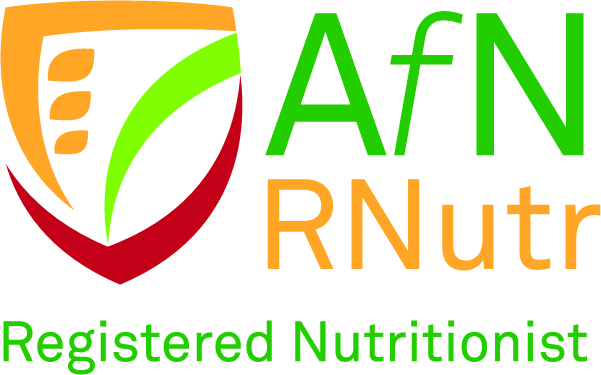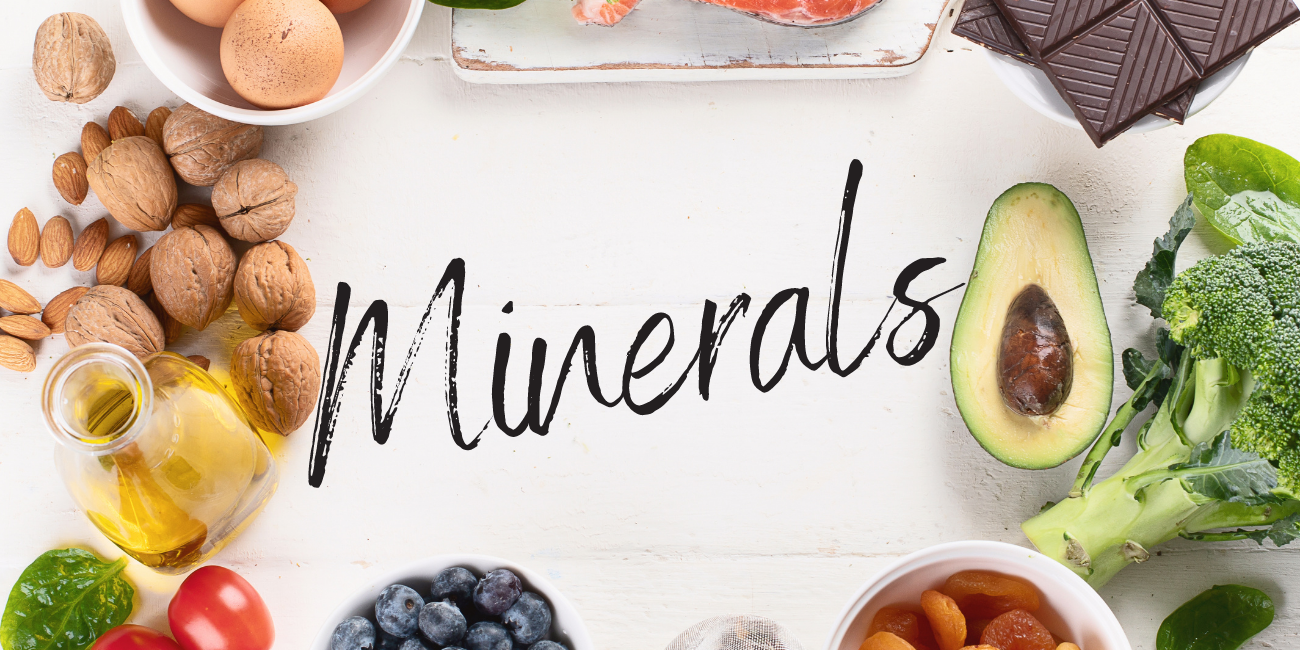Micronutrients – Part 2 – Minerals
In part 1 of my micronutrients blog, I covered all you need to know about vitamins. Click here to read part 1 now. This blog focuses on minerals.
As mentioned previously, for many people all the minerals needed can be obtained from what we eat and drink, however, some groups are recommended to take supplements, especially those who don’t consume all food groups e.g. vegans, vegetarians, and those with specific medical conditions).
Minerals can be divided into two groups:
Macrominerals (needed in larger amounts) and microminerals* (needed in very small amounts).
- microminerals are also known as trace minerals
As a reminder here are the units for micronutrients:
- mg – which is a milligram – 1 thousandth of a gram
- μg or mcg – which is a microgram and is 1 millionth of a gram
- IU – which stands for International Units. This is sometimes used for vitamins A, D and E.
Here’s all you need to know about minerals
Quick Search Contents:
- Sodium
- Potassium
- Calcium
- Magnesium
- Phosphorus
- Manganese
- Iron
- Fluoride
- Zinc
- Iodine
- Chromium
- Selenium
- Copper
Macrominerals
Sodium
Our kidneys regulate sodium by removing excess out via our urine. The more excess we have though the harder it becomes to have an efficient system. In the UK (and actually most developed countries around the world) we consume far too much.
The words ‘sodium’ and ‘salt’ are often used interchangeably – but although salt actually means ‘sodium + chloride’, most of our sodium intake comes from salt so health advice tends to focus on this.
Adults and children >11yrs should be having no more than 6g salt per day – this is around 1 teaspoon (children 1-3yrs <2g; 4-6yrs <3g; 7-10yrs <5g).
Continued excessive intake of sodium can increase the risk of high blood pressure, cardiovascular disease and stroke. The salt content of different foods is highly dependent on the brand, so check out the labels of your favourite foods.
Potassium
Foods with potassium help control blood pressure by blunting the effects of sodium and helping to relax blood vessel walls, which helps lower blood pressure. The more potassium you have, the more sodium is lost through urine.
UK adults should be aiming for 3,500mg a day – which if you’re having a varied diet across the week is more than achievable.
Potassium is found in lots of food – including bananas, some vegetables (esp. broccoli, parsnips and brussels sprouts), beans, pulses, nuts and seeds, fish, shellfish and some meats.
Unlike sodium, most of us need to consume MORE potassium (excluding those with kidney disease or anyone with a condition that affects how the body handles potassium/taking certain medications).
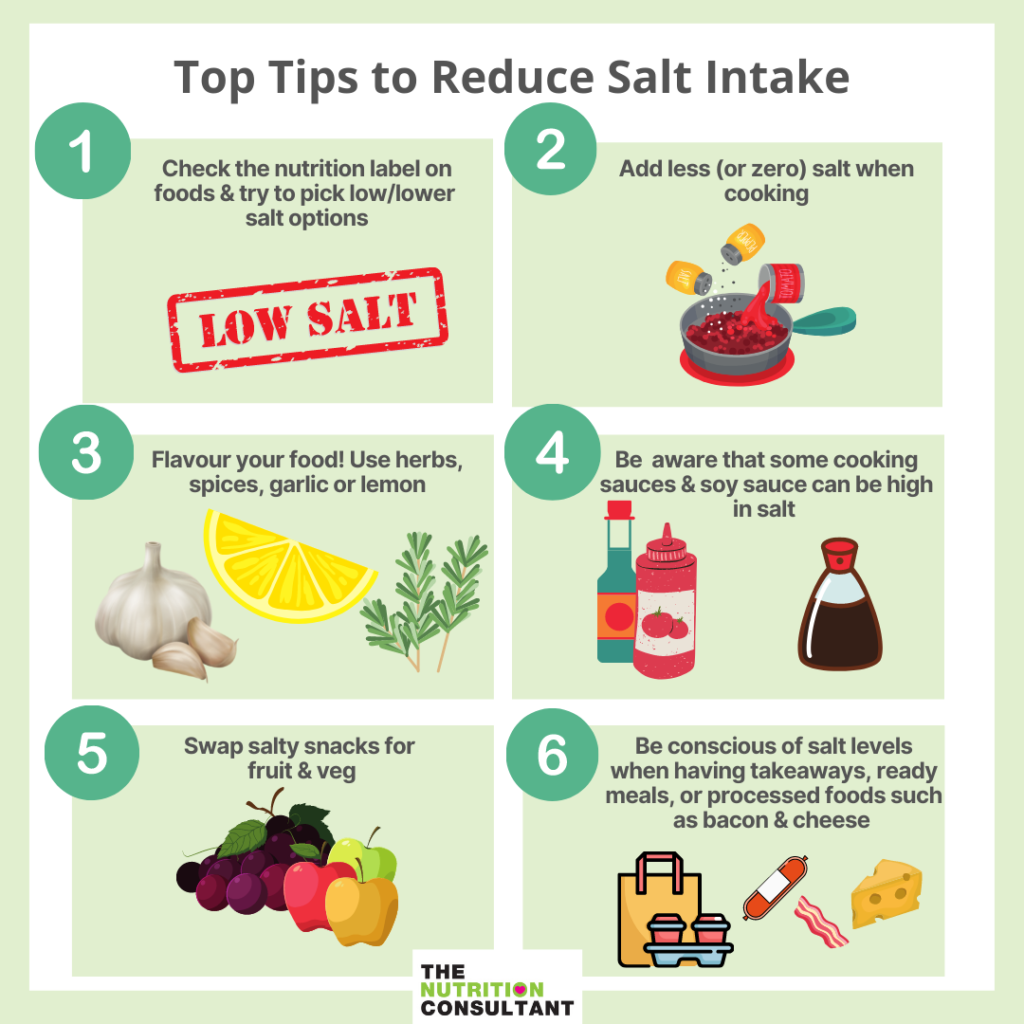
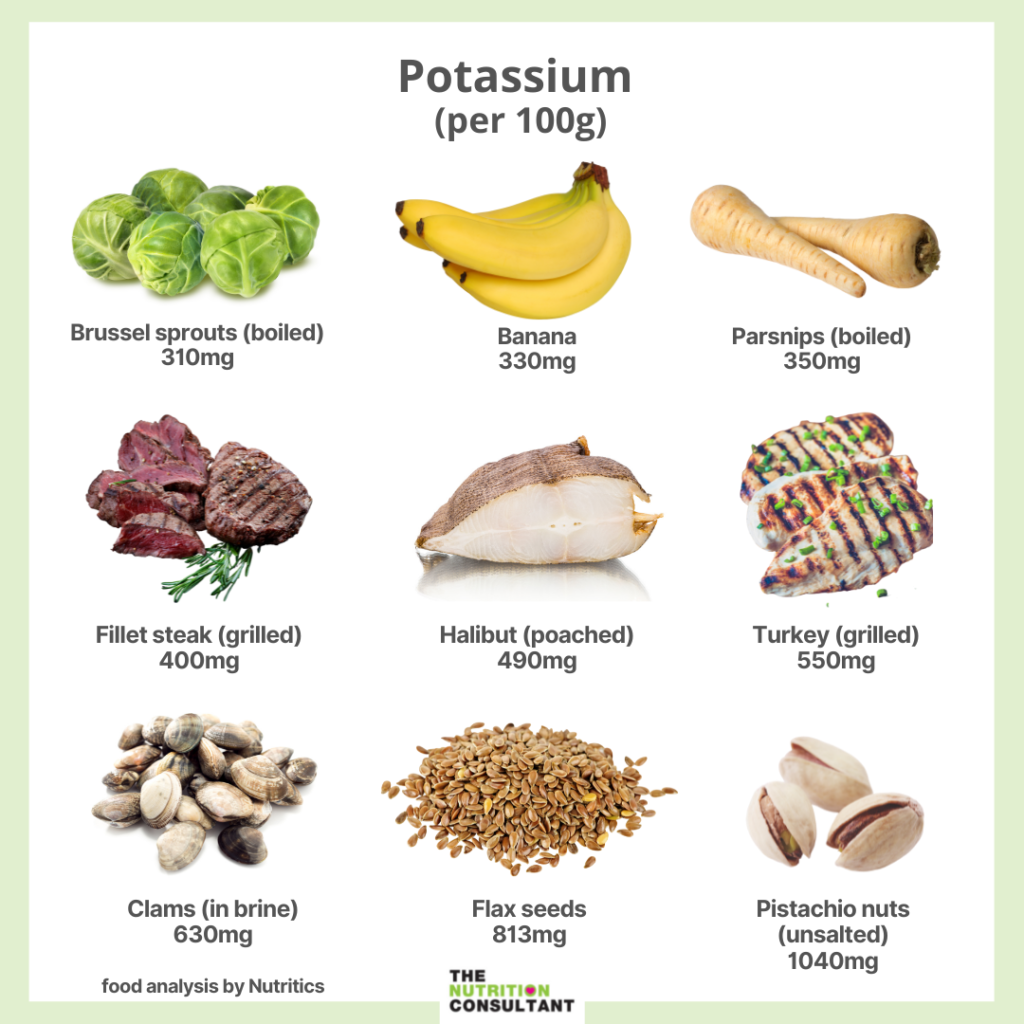
Calcium
Calcium is a mineral most people are familiar with; famously known to give us strong bones and teeth. It also helps regulate muscle contraction and ensure the blot clots as it should.
Calcium is not just important when we are young and rapidly growing, it’s actually important throughout our whole life cycle (although especially so in younger and older individuals). Adults need 700mg per day.
Having a daily supply of Vitamin D increases the absorption of calcium in foods (see vitamin D in part 1 of the blog).
Good sources of calcium include milk, cheese, bread (although not wholemeal), fortified soya, fish eaten with the bones (e.g. sardines, tinned salmon, whitebait). Smaller amounts are found in green vegetables such as cabbage and broccoli.
Taking too much calcium (>1500mg) can lead to stomach pain and diarrhoea.
Magnesium
Magnesium is needed for more than 300 biochemical reactions in the body turning the food we eat into energy whilst enabling us to maintain normal nerve and muscle functions, supporting our immune system and keeping our bones strong.
Men need 300mg magnesium per day vs. women who need 270mg.
Good sources of magnesium include meats, fish, bread (including wholegrain!), dairy foods, nuts, brown rice and green leafy vegetables such as spinach – even dark chocolate is a good source!
For most people, supplementation is not necessary (unless advised by your GP). You should be able to get all the magnesium you need by eating a varied and balanced diet.
You may experience diarrhoea if consuming large quantities of magnesium, more than 400mg.
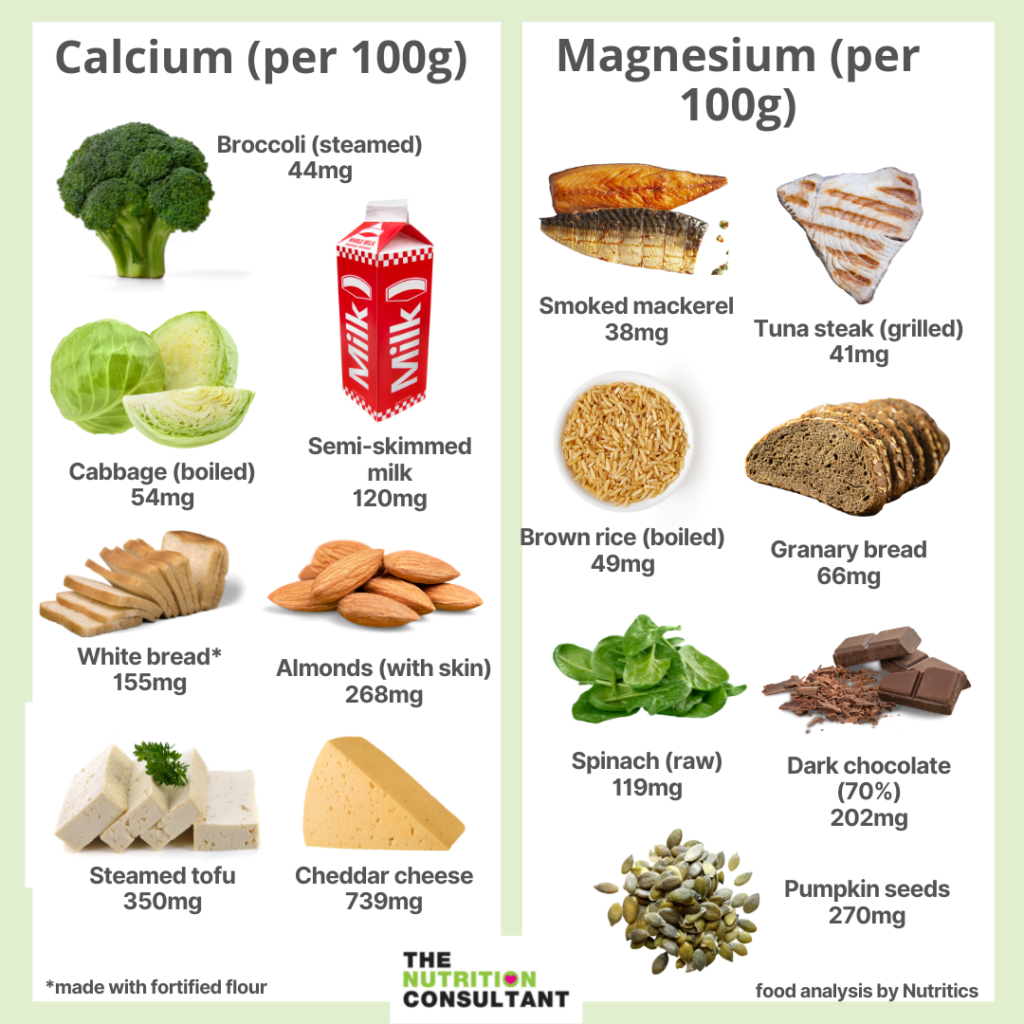
Phosphorus
Phosphorus is used in the body with calcium to form healthy bones and teeth. 80% of phosphorous is found in calcium salts in all bones in the body. The rest is spread out in all of the cells contributing to energy metabolism.
The adult recommended daily intake is 550mg, which you should be able to get from your daily diet.
UK deficiency is rare as this mineral is widely available (red meat, dairy foods, brown rice, oats, fish and usually in foods containing calcium). But taking large doses can cause stomach pain and diarrhoea, in the short term. And high quantities taken for a long period of time can reduce the amount of calcium being absorbed into the body which can lead to weaker teeth and bones.
Manganese
Manganese ensures the enzymes in the body are activated so can help carry out reactions such as breaking down the food we eat.
You can find this mineral in many foods such as bread, green vegetables like spinach and peas, nuts, breakfast cereals (especially wholegrain) and tea!
You should be able to get all the manganese you need by eating a varied and balanced diet.
If you are advised to take a manganese supplement, do not take too much. This could cause fatigue, depression, nerve damage and muscle pain if too much is taken over a long time.
Microminerals
Iron
Along with many other roles in the body, Iron is essential because it creates haemoglobin in our blood that transports oxygen around our bodies. It also plays an important role in maintaining a healthy immune system.
More than 2 billion people worldwide suffer from iron deficiency anaemia, making it the most common nutritional deficiency condition. In particular, women of childbearing age and teenage girls need to ensure they consume adequate dietary iron because their requirements are higher than those of men of the same age (please speak with your GP if you are concerned).
Iron has two main forms:
1️. Haem Iron (found in animal foods) – these generally are most easily absorbed
2️. Non-Haem Iron (found in plant foods) – it’s perfectly possible to get all your iron needs if following a plant-based, vegetarian or vegan diet by consuming regular portions of plant foods rich in iron and knowing how to increase absorption will really help
Take a look at the infographic below for how you can increase absorption of iron; which foods are good sources of iron and how much we need through the life stages.
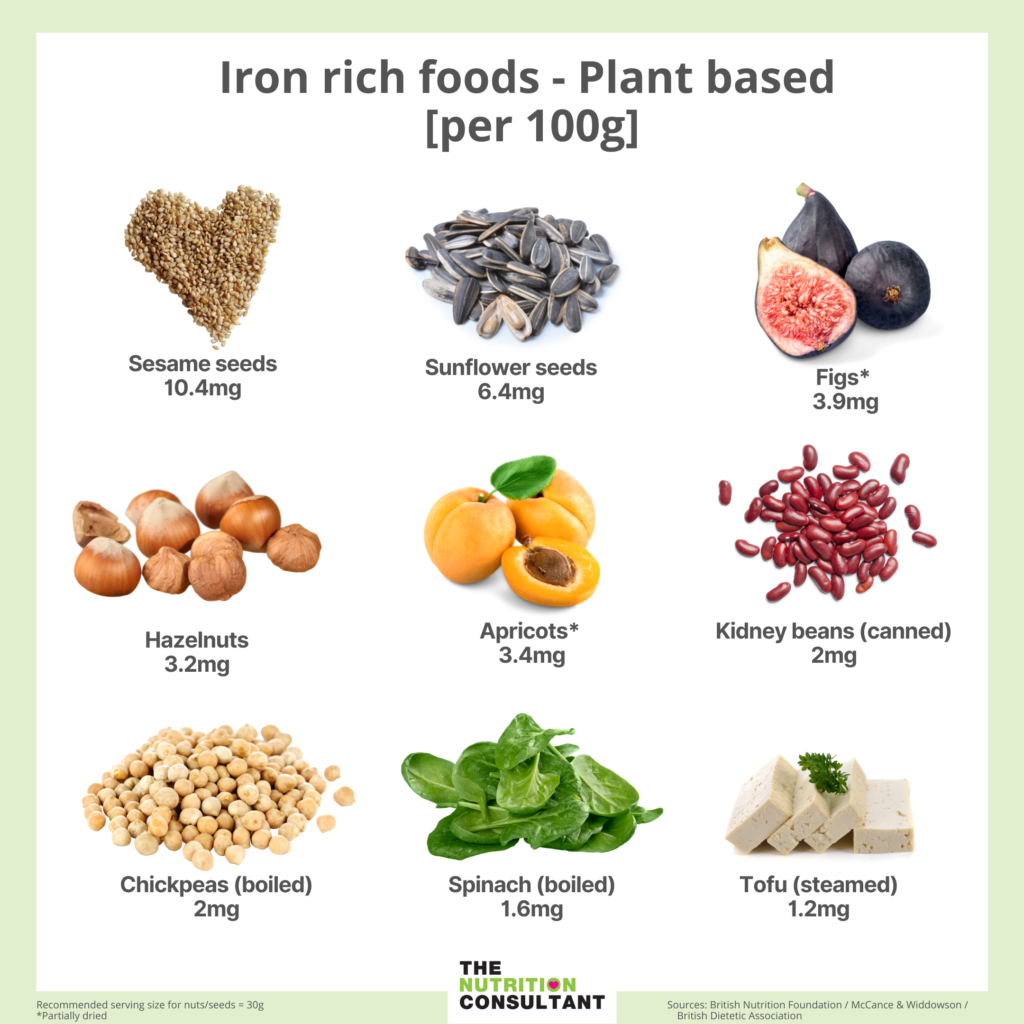
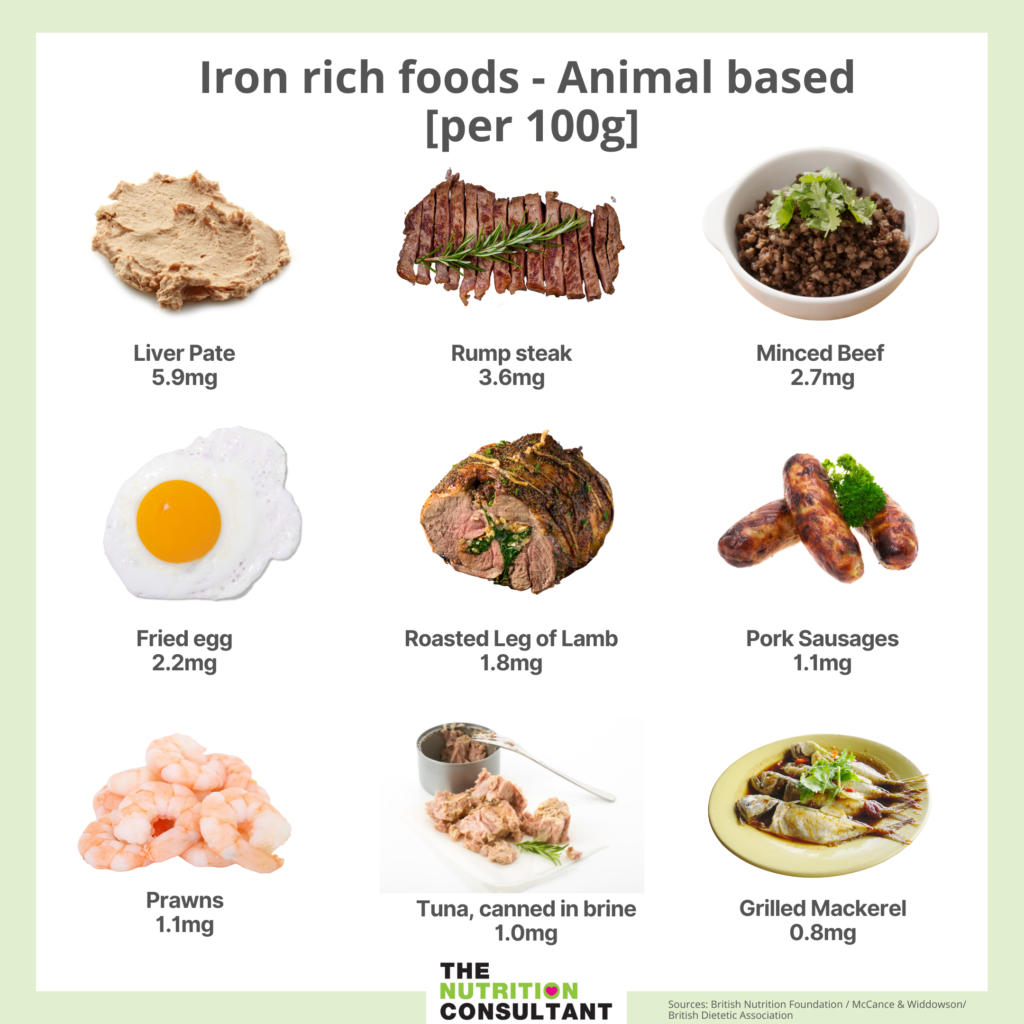
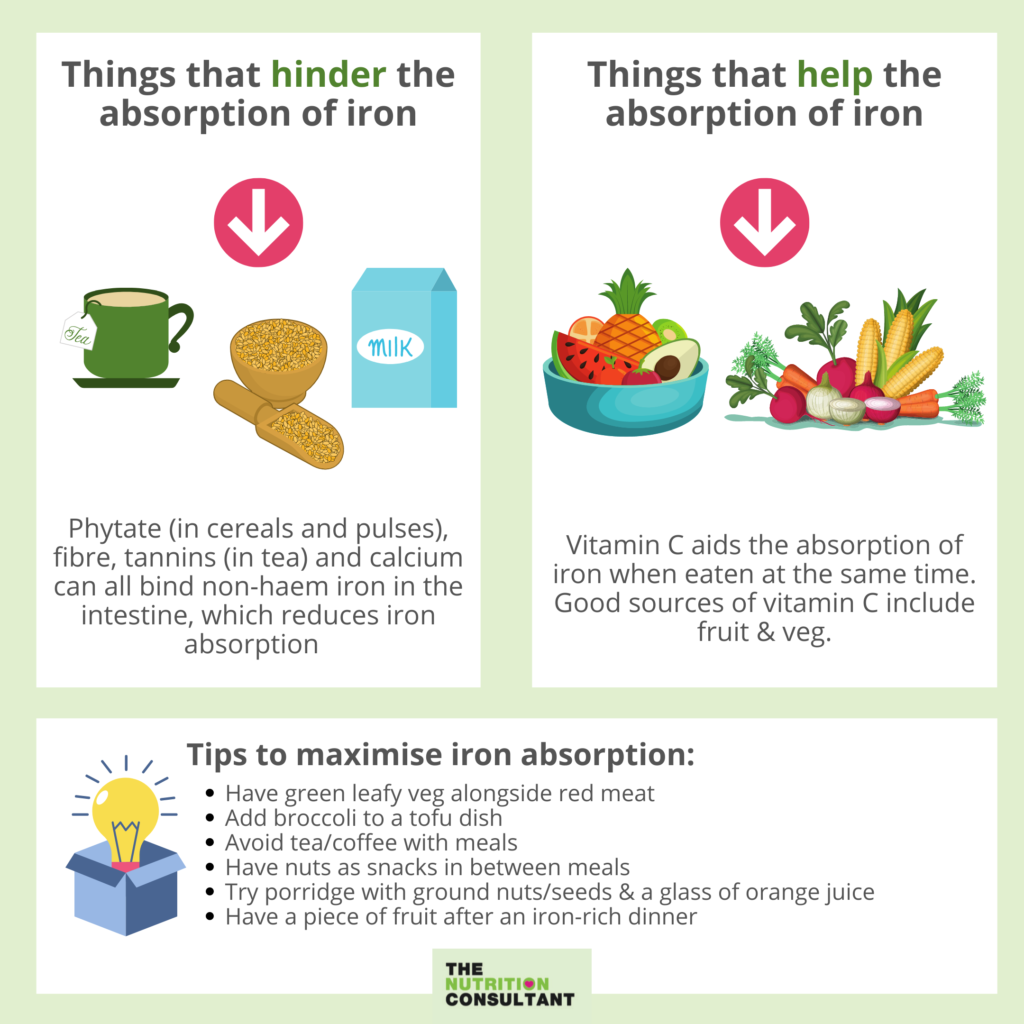
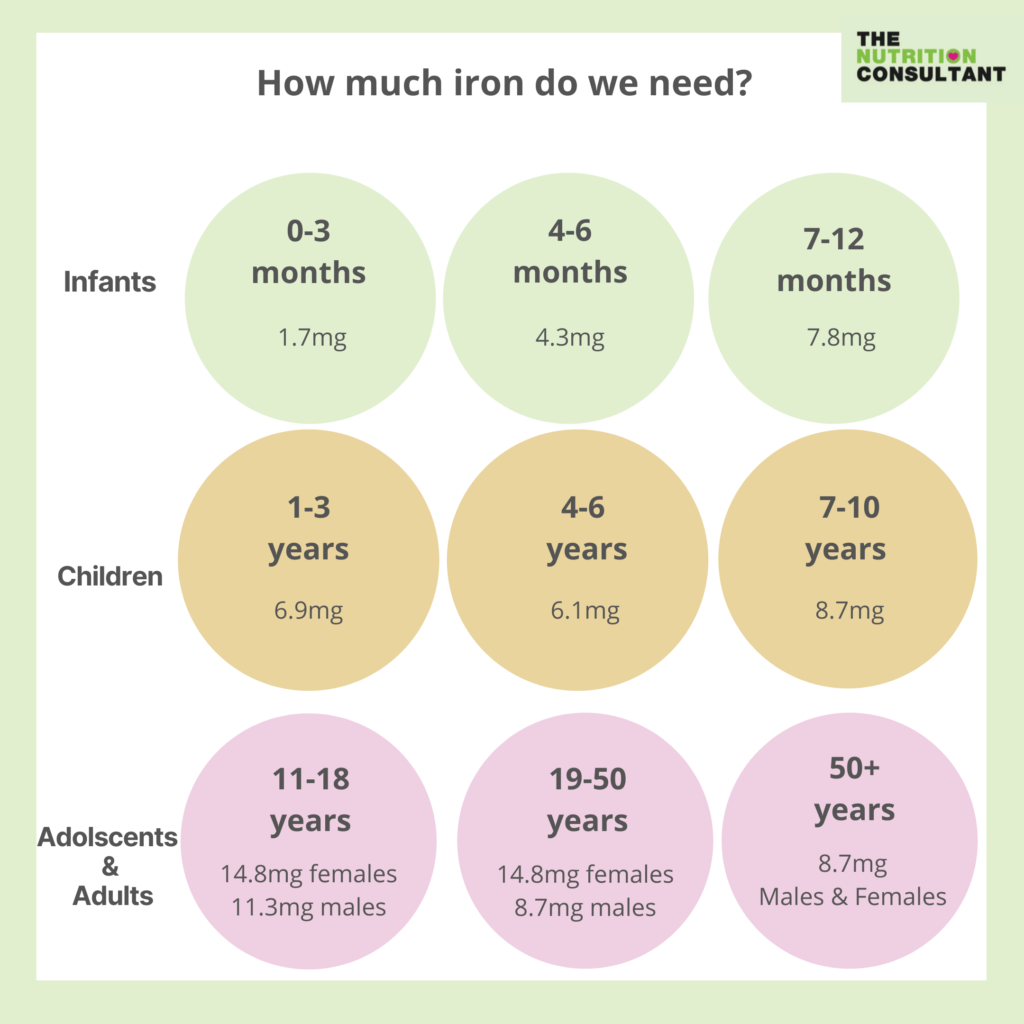
Fluoride
Fluoride is used by the body for the mineralisation of bones and teeth and helps to protect against tooth decay.
It’s mainly found in toothpaste and tap water and in the early 20th century it was discovered people had less tooth decay in areas with higher fluoride levels in drinking water. This is when fluoridation schemes were introduced (in the UK this was 1964), however, fluoride is not added to tap water in all regions. Most water companies have an online facility that you can input your postcode to check the water where you live. The decision about whether to add fluoride to the water supply is made by individual local authorities.
Brushing teeth thoroughly with fluoride toothpaste is one of the most effective ways of preventing tooth decay (diet is the other key one!). Other fluoride containing products include tea and fish.
Some reports claim fluoride is linked to a variety of health conditions, however, there is no convincing evidence so far to support these claims.
There is however something called dental fluorosis which can sometimes occur if a child’s teeth are exposed to too much fluoride when they’re developing – check out the NHS website for more details.
Zinc
Zinc is used for many processes in the body including releasing energy from food, tissue growth, functioning of the immune system, wound healing, and for normal reproductive development.
Adults need around 9.5mg per day (men) and 7mg per day (women). Keep in mind that if you take a supplement, zinc can reduce absorption of copper which can lead to anaemia and bone weakening.
Meat is the greatest source of zinc as it is most readily absorbed, however, it is also present in milk, cheese, eggs, shellfish, wholegrain cereals, nuts and pulses.
Iodine
Iodine is important for thyroid hormones and used for development during the early years such as; growth, metabolism and for development of the brain.
Deficiency during pregnancy can have a severe impact on a baby. Iodine deficiency in the UK is rare however, teenage girls and young women have shown to have lower intakes which is concerning considering the importance of this nutrient in pregnancy (or future pregnancy).
Adults need 150mcg per day and these requirements increase for pregnant and breastfeeding women (200mcg).
Good sources of iodine are white fish, milk, dairy. It can also be found in some plant foods but amounts vary dependent on how much iodine is in the soil and not all plant-based milk drinks are fortified with iodine.
In many countries ‘iodised salt’ is very common in table salt but not used as much in the UK. As seaweed is such a concentrated source of iodine, eating more than one portion a week is not recommended.
Most people should be able to get all the iodine needed by eating a varied and balanced diet, however, if you follow a vegan/vegetarian diet or do not eat any fish then you may need to take an iodine supplement (discuss with your GP first as taking too much can be harmful).
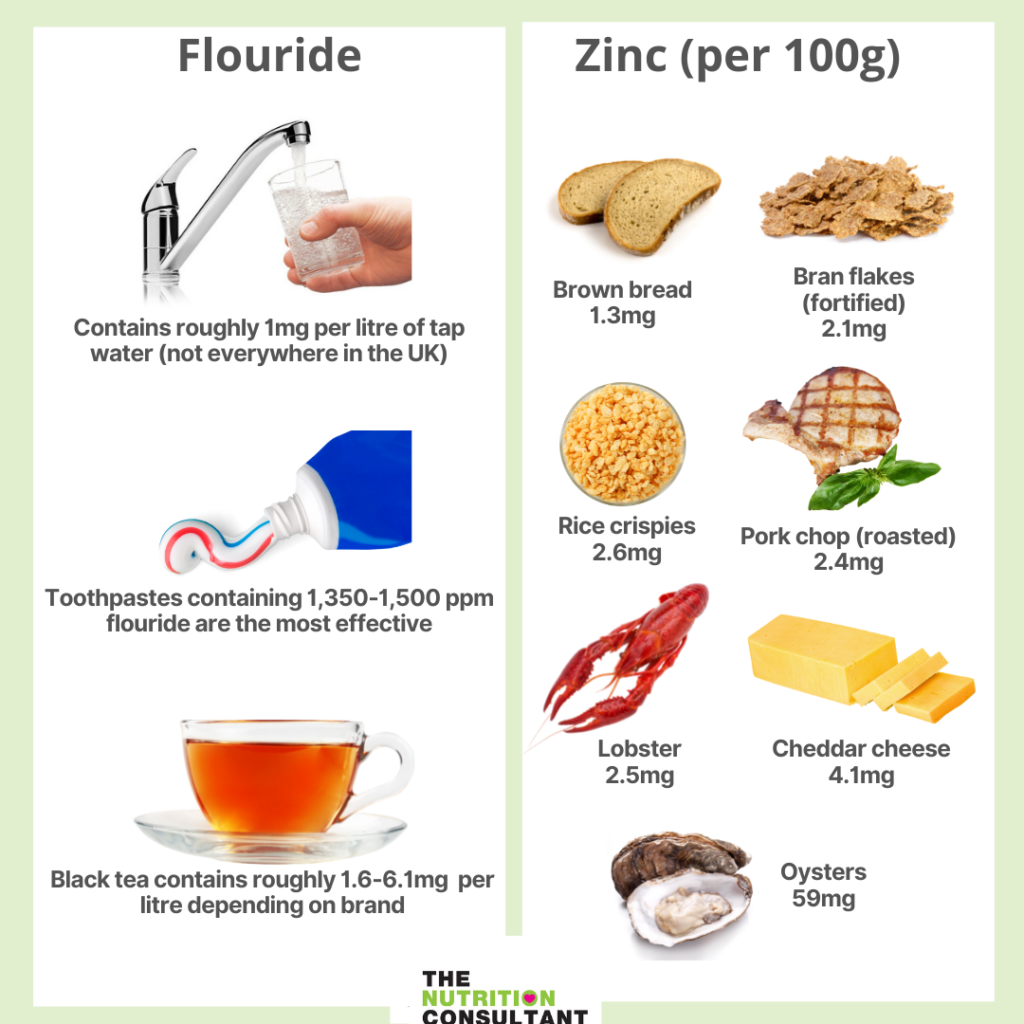
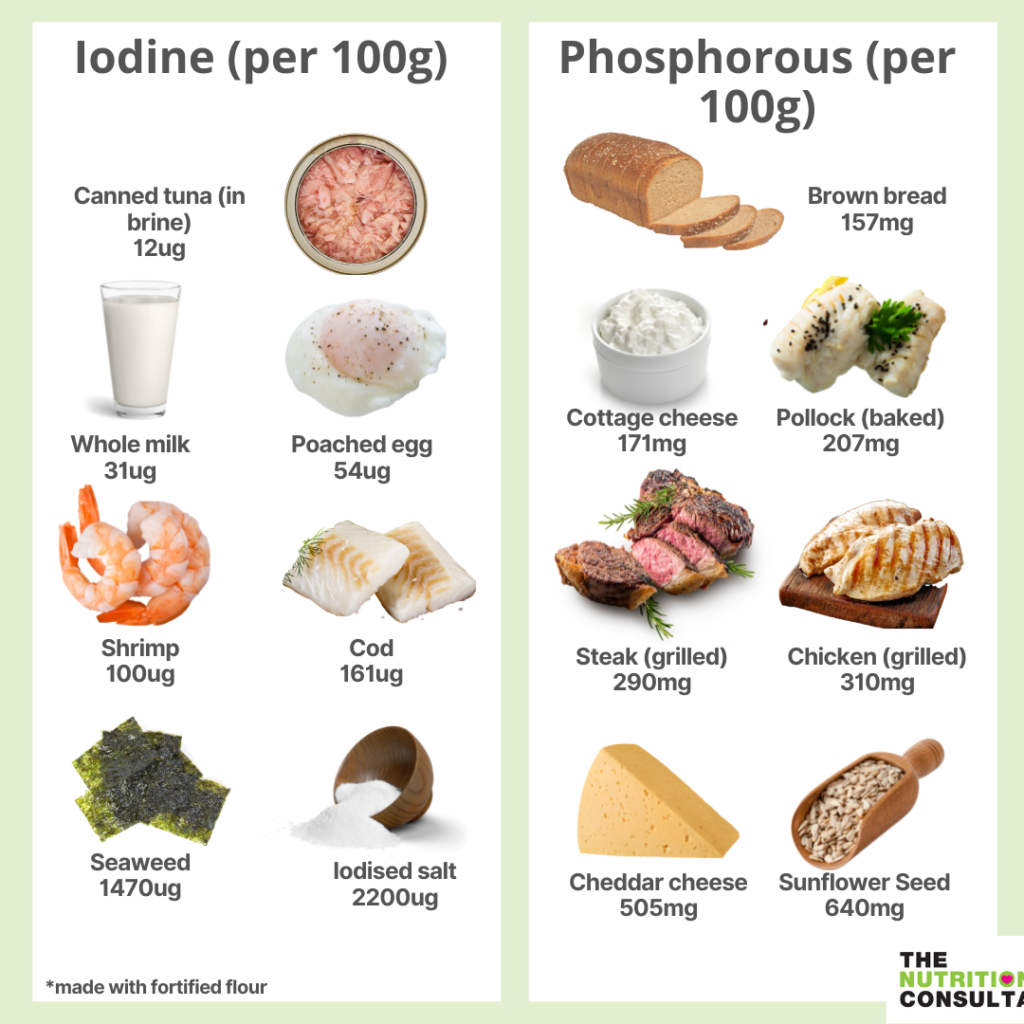
Chromium
Chromium’s function in the body is linked to promoting insulin to control glucose levels within the blood.
It can be found in meat, nuts, yeast, cereal grains and molasses.
We need about 25mcg per day and eating a varied diet will ensure you get what you need.
If you are advised to take a chromium supplement, do not take too much as this could be harmful.
Selenium
Selenium is used to ensure the immune system works properly as it is an element in some antioxidant enzymes, essential (like iodine) for thyroid hormone production and the reproductive system. It also helps prevent damage to cells and tissues.
Requirements for men are 75ug per day and women are 60ug per day.
Selenium is found in foods such as brazil nuts, eggs, meat, fish, bread and cereals and as always, having a varied diet should ensure you meet the requirements.
Generally, selenium intakes in the UK are below this (especially in people who do not eat meat, fish or nuts). However, having too much selenium consistently can result in brittle nails and hair, skin lesions and garlic smelling breath!
Copper
Copper is a mineral that produces red and white blood cells and is important for many enzymes, infant growth, brain development, our immune systems and for strong bones.
Adults need 1.2mg per day. For good sources of copper aim to eat; nuts, shellfish, kidney, liver and wholegrain cereals.
Excess copper is rare due to the absorption being tightly controlled in the body, but if you did consume too much you may experience stomach upset and possible liver and kidney damage.
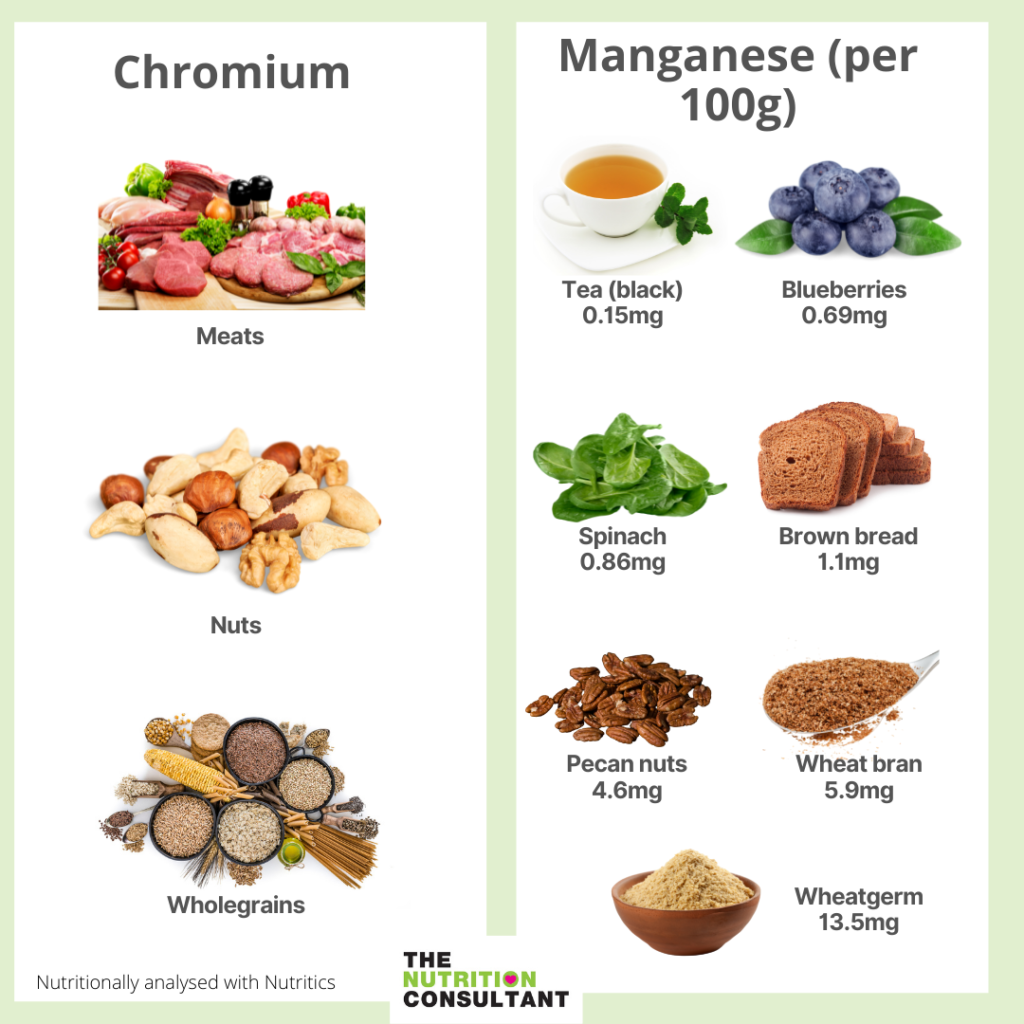
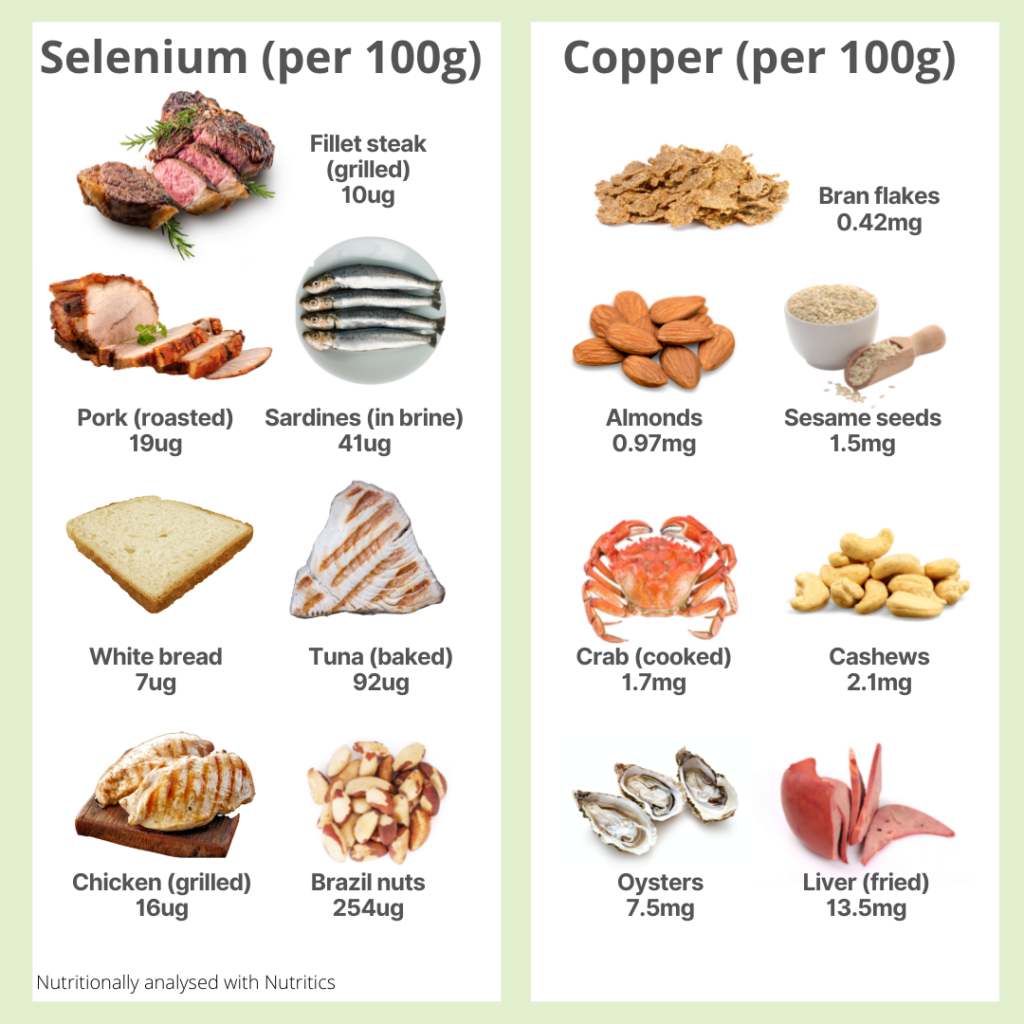
Summary
As I stated in part 1, everything I have shared in this blog is based on average UK population data. Some people may need more than the average, and some people may need less.
Most people can get all the vitamins and minerals they need through their diet. However, if you exclude entire food groups from your diet (e.g. meat or dairy), then it is generally recommended you take specific supplements to minimise the risk of deficiency. Please speak with your GP or other health professionals for personal advice.
I hope you found this 2 part blog on micronutrients useful. For all this information in one place be sure to save my Nutrient Focus Guide over on Instagram.
